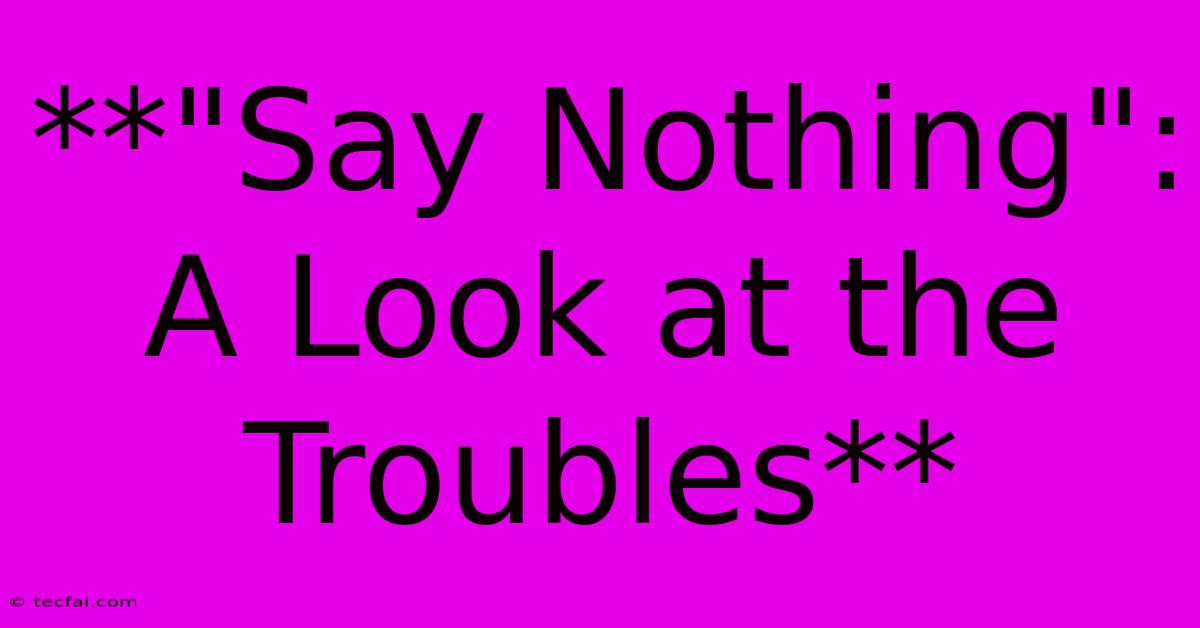**"Say Nothing": A Look At The Troubles**

Discover more detailed and exciting information on our website. Click the link below to start your adventure: Visit Best Website tecfai.com. Don't miss out!
Table of Contents
"Say Nothing": A Look at the Troubles
"Say Nothing: A True Story of Murder and Memory in Northern Ireland" by Patrick Radden Keefe isn't just a book; it's a meticulously researched deep dive into the complexities and brutality of The Troubles, the decades-long conflict in Northern Ireland. Keefe masterfully weaves together the personal stories of those caught in the crossfire with the larger political machinations that fueled the violence, leaving readers with a profound understanding of a tragically fractured society. This exploration delves into the heart of the conflict, examining its roots, its devastating impact, and its lingering legacy.
Understanding the Historical Context of The Troubles
The Troubles, encompassing roughly three decades from the late 1960s to the Good Friday Agreement in 1998, pitted Irish nationalists (predominantly Catholic) against Unionists (largely Protestant). At its core lay the question of Northern Ireland's status: should it remain part of the United Kingdom, or unite with the Republic of Ireland? This seemingly simple question fueled a conflict marked by sectarian violence, political assassinations, and the pervasive presence of paramilitary groups like the Provisional Irish Republican Army (IRA) and loyalist organizations. Keefe's book effectively contextualizes these groups within the broader historical narrative, explaining their motivations and illustrating their devastating impact on civilians.
The Disappearance of Jean McConville: A Microcosm of the Conflict
The book centers around the abduction and murder of Jean McConville, a mother of ten, by the IRA in 1972. McConville’s crime? She was allegedly accused of being an informer, a charge that remains fiercely contested. Keefe's investigation into McConville's fate serves as a powerful lens through which to examine the brutality of the conflict. It reveals not only the IRA's capacity for violence but also the chilling culture of secrecy and impunity that allowed such actions to occur. The story highlights the devastating impact on victims' families, the struggle for justice, and the enduring pain of unresolved trauma.
Exploring the Legacy of Trauma and the Search for Truth
The book doesn't shy away from the difficult realities of the conflict. It explores the pervasive trauma experienced by victims and their families, often forced to navigate a system that seemed unwilling or unable to provide justice. Keefe’s meticulous research unveils the intricate web of lies, cover-ups, and denials that characterized the Troubles. The story of Jean McConville's disappearance and the subsequent search for her remains becomes a symbol of the broader struggle for truth and reconciliation in Northern Ireland. The book forces readers to confront the lasting psychological scars left by the violence and the ongoing challenges of dealing with a legacy of unresolved issues.
The Power of Storytelling and Investigative Journalism
"Say Nothing" is a masterclass in investigative journalism. Keefe's ability to weave together seemingly disparate threads—personal narratives, historical analysis, and political maneuvering—creates a compelling and deeply moving narrative. The book stands as a testament to the power of storytelling in illuminating complex historical events and shedding light on the human cost of conflict. By focusing on individual stories within the broader context of The Troubles, Keefe makes the abstract realities of political violence intensely personal and unforgettable.
Beyond the Book: Continuing the Conversation
Keefe’s work is more than just a historical account; it's a call to grapple with the past and acknowledge its ongoing impact. The Troubles remain a sensitive and complex issue, and "Say Nothing" encourages a deeper engagement with the historical realities of the conflict and the urgent need for continued efforts toward reconciliation and understanding. It reminds us that even in the face of unimaginable violence, the human stories of resilience, loss, and the persistent search for justice must be heard and remembered. The book's lasting impact lies in its ability to foster empathy and promote continued conversations about peacebuilding and the challenges of navigating a divided society.

Thank you for visiting our website wich cover about **"Say Nothing": A Look At The Troubles**. We hope the information provided has been useful to you. Feel free to contact us if you have any questions or need further assistance. See you next time and dont miss to bookmark.
Featured Posts
-
Greece Vs England Live Three Lions Secure Victory
Nov 15, 2024
-
Meet Pedro Pascals Younger Sister
Nov 15, 2024
-
Aus Wins 1st T20 I Against Pakistan By 29 Runs
Nov 15, 2024
-
Nations League Carsley Impressed By Young Players
Nov 15, 2024
-
Bluesky App Everything You Need To Know
Nov 15, 2024
